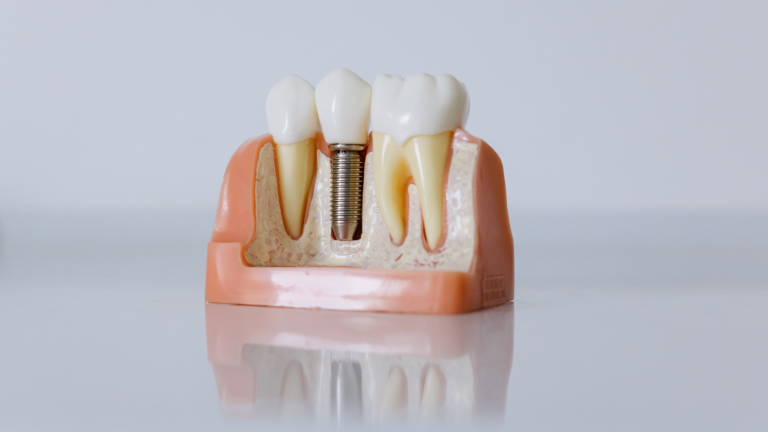- +234 907 000 9666 | +234 708 282 9222 | +234 915 027 7777
- info@familydentalcares.com
- Mon - Fri: 9:00 - 18:00

Dental implants are a popular and effective way to replace missing teeth. They consist of a metal post that is surgically implanted into the jawbone, which serves as a replacement for the root of the missing tooth. A prosthetic tooth is then attached to the post, creating a natural-looking and functional replacement tooth.
Dental implants have many benefits over other tooth replacement options, such as dentures or bridges. They are more comfortable, durable, and long-lasting than these alternatives, and they do not require any special care beyond regular brushing and flossing.
The dental implant procedure typically involves several steps. First, the dentist will examine the patient’s mouth and take x-rays to determine if they are a good candidate for the procedure. If so, they will schedule the surgery.
During the surgery, the dentist will make an incision in the gum tissue and drill a hole in the jawbone to insert the implant post. The patient will then need to wait several months for the post to fuse with the bone in a process called osseointegration. Once this is complete, the dentist will attach a prosthetic tooth to the post.
Caring for dental implants is similar to caring for natural teeth. It is important to brush and floss regularly to prevent plaque buildup and maintain good oral hygiene. Patients should also visit their dentist regularly for checkups and cleanings.
It is important to avoid chewing on hard foods or objects, as this can damage the prosthetic tooth or the implant post. Patients should also avoid smoking or using tobacco products, as this can increase the risk of implant failure.
While dental implants are generally safe and effective, there are some potential risks and complications to be aware of. These include infection, nerve damage, and implant failure.
To minimize these risks, it is important to choose a qualified and experienced dentist to perform the procedure. Patients should also follow all post-operative instructions carefully and report any unusual symptoms or complications to their dentist right away.
The cost of dental implants can vary depending on a number of factors, including the number of implants needed, the location of the provider, and the complexity of the procedure. In general, dental implants are more expensive than other tooth replacement options, such as dentures or bridges.
However, some insurance plans may cover part or all of the cost of dental implants, particularly if they are deemed medically necessary. Patients should check with their insurance provider to see what coverage is available.
Dental implants are a safe and effective way to replace missing teeth, offering many benefits over other tooth replacement options. By following good oral hygiene practices and choosing a qualified and experienced provider, patients can enjoy the long-lasting benefits of dental implants.
If you are considering dental implants, talk to your dentist to see if they are a good option for you. With proper care and maintenance, dental implants can provide a natural-looking and functional replacement for missing teeth.